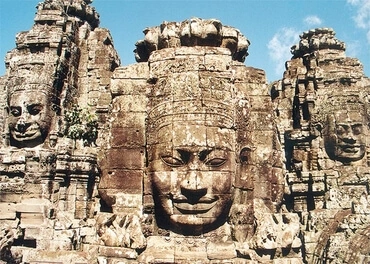1
And Moses with the ancients of Israel commanded the people, saying: Keep every commandment that I command you this day.
2
And when you are passed over the Jordan into the land which the Lord thy God will give thee, thou shalt set up great stones, and shalt plaster them over with plaster,
3
That thou mayst write on them all the words of this law, when thou art passed over the Jordan: that thou mayst enter into the land which the Lord thy God will give thee, a land flowing with milk and honey, as he swore to thy fathers.
4
Therefore when you are passed over the Jordan, set up the stones which I command you this day, in mount Hebal, and thou shalt plaster them with plaster:
5
And thou shalt build there an altar to the Lord thy God, of stones which iron hath not touched,
6
And of stones not fashioned nor polished: and thou shalt offer upon it holocausts to the Lord thy God:
7
And shalt immolate peace victims, and eat there, and feast before the Lord thy God.
8
And thou shalt write upon the stones all the words of this law plainly and clearly,
9
And Moses and the priests of the race of Levi said to all Israel: Attend, and hear, O Israel: This day thou art made the people of the Lord thy God.
10
Thou shalt hear his voice, and do the commandments and justices which I command thee.
11
And Moses commanded the people in that day, saying:
12
These shall stand upon mount Garizim to bless the people, when you are passed the Jordan: Simeon, Levi, Juda, Issachar, Joseph, and Benjamin.
13
And over against them shall stand on mount Hebal to curse: Ruben, Gad, and Aser, and Zabulon, Dan, and Nephtali.
14
And the Levites shall pronounce, and say to all the men of Israel with a loud voice:
15
Cursed be the man that maketh a graven and molten thing, the abomination of the Lord, the work of the hands of artificers, and shall put it in a secret place: and all the people shall answer and say: Amen.
16
Cursed be he that honoureth not his father and mother: and all the people shall say: Amen.
17
Cursed be he that removeth his neighbour's landmarks: and all the people shall say: Amen.
18
Cursed be he that maketh the blind to wander out of his way: and all the people shall say: Amen.
19
Cursed be he that perverteth the judgment of the stranger, of the fatherless and the widow: and all the people shall say: Amen.
20
Cursed be he that lieth with his father's wife, and uncovereth his bed: and all the people shall say: Amen.
21
Cursed be he that lieth with any beast: and all the people shall say: Amen.
22
Cursed be he that lieth with his sister, the daughter of his father, or of his mother: and all the people shall say: Amen.
23
Cursed be he that lieth with his mother in law: and all the people shall say: Amen.
24
Cursed be he that secretly killeth his neighbour: and all the people shall say: Amen.
25
Cursed be he that taketh gifts, to slay an innocent person: and all the people shall say: Amen.
26
Cursed be he that abideth not in the words of this law, and fulfilleth them not in work: and all the people shall say: Amen.








